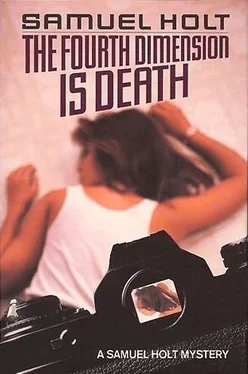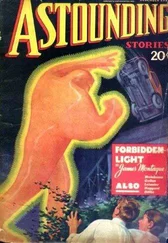After all those interior spaces, the first thing you noticed about his office were the windows. Not that he had such a grand view, it being merely of the backs of several other buildings twenty feet or so away, but just that his room acknowledged the existence of the outside world. The office itself was very wide, walls and carpet and furniture all in varying soft shades of gray, with white or blond accents. The framed and autographed blowups of stars’ photographs which were the only wall adornments were all in black-and-white. The lucite bowl of oranges on the glass and chrome Parson’s table beside the entrance was clearly to be considered a color accent and not in any way a reference to food.
Kay Henry himself was much less self-conscious than his workspace. A bulky man of about forty, with badly thinning tan hair and a round optimistic face, he wore chinos and a polo shirt and a million dollar watch and very large-lensed tortoise-shell glasses. His casual clothing, near-baldness, roundness of both face and glasses, and an open cheeriness of manner all combined to give him a look of eager expectancy, a desire to be of help and use; not a bad facade for an agent.
As Miss Colinville departed, Henry came smiling forward, hand outstretched, saying, “Morning, Ed. Sorry we’re running late around here today.”
Clearly, this office “ran late” all the time, the way doctors do. “No problem,” I said, grinning at him a little too boyishly, slumping my shoulders a bit as I shook his hand, letting his grasp be firmer than mine.
“Come sit down,” he said, patting my arm and gesturing at the L of gray couches beside us. As we took seats, he said, “How’s Julie doing?”
“Fine,” I assured him. “I saw the show. She’s really good in it.”
“A very promising girl,” he said, nodding and smiling. “Very promising.”
“We’re just pals, you know,” I said, and grinned sheepishly, and shrugged. “That’s the way she wants it.”
To his credit, Henry didn’t wince at my crudeness. “Well, she’s very high on you, Ed,” he told me, “from a professional point of view. She tells me you don’t have an agent at the moment.”
I nodded, still sheepish, and laughed at myself, saying, “Right now, I don’t even have a resumé. The airline lost my suitcase. They say I’ll probably get it in a day or two. As soon as I do, I’ll come right over with a few copies. I would have brought them now, but...” Another awkward shrug. (The fact was, any actor in my supposed position would automatically have brought his photo and resumé to this meeting, so I’d had to come up with a reason for not having done so, and the lost-suitcase gag was all I could think of.)
“No problem, Ed,” Henry told me. A legal-size yellow pad and long well-sharpened pencil were on the glass coffee table before him. Leaning forward, picking up the pencil, poising it, he said, “Why not just give me a rundown?”
So I did, reeling off to him the history of a modest middling career over a stretch of eight years, combining elements I remembered from Brett Burgess’s past with parallels to Dale Wormley’s career, plus a few other times and places I happened to know about. It was a stuttering career, with hiatuses, no lead parts, bouncing around minor regional theaters, getting some regional TV ads, other minor work; and it all ended two years ago.
Kay Henry jotted all this down in some kind of personal shorthand, nodding, treating it as seriously as though it were Laurence Olivier’s resumé, and at the end he brooded for a minute, lips pushed out, eraser end of the pencil tapping a slow drumbeat on the pad. “Nothing much recently, Ed,” he finally commented.
“There’s no point lying to you, Mr. Henry,” I said, and he raised an eyebrow at that, giving me his full attention. I made awkward body movements, making it clear I was wishing there was some point in lying to him, and then I said, “It was drink.”
“Drink?”
“I’m off it now,” I told him, sitting up straighter, giving him my most honest and level look yet. “I’m AA. I’m one of those people, Mr. Henry, it’s, I’m one of those people, it’s poison.”
Nodding sympathetically, his eyes friendly behind the large glasses, he said, “Actors, Ed, creative people like yourself, you’ve got to be so aware of that risk.”
“I am,” I said.
“You don’t live a routine life,” he told me. “Same thing, day after day. You live with variety, difference, always new places, new people, new things to think about. It’s an exciting life. It’s a great life, by golly.” He looked at me with wide-eyed envy, as though he really and truly would have preferred my scruffy existence to this luxurious nest.
“It is a good life,” I agreed solemnly, nodding at him.
“But it’s unsettling, Ed,” he went on. “Without that regularity of the average citizen’s life, somebody in your position can be vulnerable.”
Laughing bitterly, I said, “I sure was.”
“It’s happened to some of our finest actors,” he said, nodding in sympathy with human frailty everywhere. “You’re damn lucky you caught it in time.”
“Oh, I know that.”
He looked at the yellow pad again, smiled faintly, and said, “And that’s why you need a new agent.”
“Uh huh.”
“Who was your agent, Ed?”
“Blair Knox,” I told him, she being Brett Burgess’s New York agent. She and Brett were good enough friends for me to be able to ask her through him the favor of backing up my story, should Henry phone her.
Again, Henry nodded, writing Blair Knox’s name on the pad. “A good woman,” he said. “If she took you on, that’s a very strong recommendation all by itself.”
“Well,” I said, with that sheepish laugh again, “she did kind of have second thoughts there after a while.”
“Sometimes we have to make hard decisions, Ed,” he told me. “Don’t blame Blair.”
“I know who to blame, Mr. Henry,” I said fervently.
“But that’s the past,” he said. “The thing to think about now is the future. Where can I reach you, Ed?”
“I just came back to the city,” I told him, “don’t really have a place of my own yet, or a service, or anything. I’m staying with friends in Brooklyn.” And I gave him the Youngs’ number.
Having written it down, Henry dropped the pencil and leaned back on the sofa, saying, “I’m not sure what I know about right now that you’d be good for. When I get your photo and resumé, my assistants can take a more extensive look, see what’s coming up on the horizon, here in town. Or on the road.” Lifting that eyebrow again, he said, “You don’t mind going on the road, do you?”
“Well,” I said, “if I have to, you know, to make a living. But it’s easier, to, uh...”
“Stay on the wagon,” he suggested gently. “If you’re in one place.”
“I wouldn’t want that to keep me from a good part,” I told him, looking worried.
“We’ll keep that in mind,” he assured me. “And there’s a lot happening in this city right now, as a matter of fact. We’ll have a look, see what we come up with.”
This was supposed to be the end of the meeting, but instead of standing and thanking and departing I leaned forward, exhibiting many signs of embarrassment and hesitancy as I said, “Uh, Mr. Henry, there was one thing Julie told me about, a part she thought I might be right for.”
Amused, Henry looked at me and said, “Oh? What was that, Ed?”
“It was something her boyfriend was going to do,” I said, and gestured with head and hand as though directing our attention to the past. “You know, the guy who, uh...Dale Wormley.”
Pain crossed Henry’s features. “A terrible thing, that,” he said. “Poor Dale. God damn it, poor Dale.”
Читать дальше












